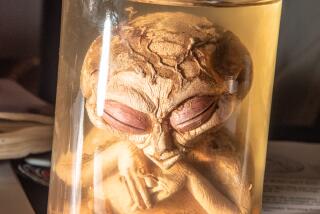Seeking Common Ground
- Share via
From the Big Bang 15 billion years ago to the cloning of a sheep named Dolly, the war between religion and science often has left little room for reconciliation.
But one man, physicist and theologian Ian Barbour, has struggled to make peace. Earlier this week, Barbour, who pioneered dialogue between the two realms, was awarded the $1.24-million Templeton Prize for Progress in Religion.
Barbour, 75, professor emeritus of religion and physics at Carleton College in Northfield, Minn., laid the groundwork for a new interdisciplinary field with his 1965 book, “Issues in Science and Religion.” The book soon became the seminal text in the field influencing a generation of scientists, religious scholars, ethicists and laity.
Barbour spent the rest of his 50-year academic career breaking down barriers between spirituality and science by researching, writing 12 books and more than 50 articles and finding ways to integrate the separate worlds into one. His most recent publication is “Religion and Science: Historical and Contemporary Issues.” Barbour’s writings have been translated into Spanish, German, Polish, Russian, Chinese and Korean.
“I always felt we needed to move beyond the hostility. Scientists say they believe in evolution, not God. Religious scholars say they believe in God, but not evolution,” said Barbour. “Well, I say we don’t have to choose a side. We can meet somewhere in the middle.”
In nominating Barbour for the world’s largest monetary award, John B. Cobb Jr., professor emeritus of the School of Theology at Claremont College, said: “No contemporary has made a more original, deep and lasting contribution toward the needed integration of scientific and religious knowledge and values than Ian Barbour. With respect to the breadth of topics and fields brought into this integration, Barbour has no equal.”
International investor John M. Templeton founded the Templeton prize in 1972 to honor those who have shown extraordinary originality in advancing the understanding of God or spirituality, an area overlooked by the Nobel Prize. The first winner was Mother Teresa, founder of the Missionaries of Charity. Other honorees include the Rev. Billy Graham, physicist Paul Davies and Russian writer Alexander Solzhenitsyn.
The announcement of the award was made Wednesday at the Church Center for the United Nations in New York. Barbour will accept the prize in a private ceremony May 11 at Buckingham Palace in London, followed by a public ceremony at the Kremlin.
Barbour, a member of the United Church of Christ, a Protestant denomination, said he will give $1 million of his prize to the Center for Theology and the Natural Sciences, affiliated with the Graduate Theological Union in Berkeley. He asked that his gift be used as an endowment for student scholarships and teachers who attend programs at the center.
Robert Russell, founder and director of the Berkeley center, credited Barbour with “constructing bridges and finding the commonalities in the fields” that allowed a civil discussion to begin.
Currently, the Center for Theology and the Natural Sciences is involved in a “science and religion course program” to stimulate more classes in science and religion in universities and seminaries across the country.
“Forty years ago, few scientists had even a passing tolerance for religion, and few theologians had any real interest in science. More than anyone else alive today, Dr. Barbour has changed all that,” Russell said.
Barbour was born in Beijing, the son of a Presbyterian father and Episcopalian mother. He studied at Swarthmore College, Duke University and the University of Chicago, where he completed a doctorate in physics in 1949. Four years later, Barbour enrolled at Yale Divinity School.
Although at one time Barbour was the lone voice advocating more discussion between scientists and theologians, today scores of college courses bring together both disciplines and the number of books published since 1950 under the Library of Congress heading “Religion and Science” has tripled. The American Academy of Religion and the American Assn. for the Advancement of Science have programs on the topic at their national and regional meetings.
Advances in cloning and genetic engineering have raised ethical questions that Barbour says make religion more relevant.
“Science can tell you what’s possible, but it certainly can’t tell you what’s desirable,” Barbour said. “This involves questions of human dignity, and input from both sides should be encouraged. These are ethical decisions which should not be left to scientists alone, but require public discussion because the future of humanity is at stake.”
Even so, there are still many scientists who believe that religion will always stand in direct conflict to science and that the two realms should remain in opposition to each other. Paul Kurtz, head of the committee for the Scientific Investigation of Claims of the Paranormal, is troubled by new books by scientists pointing to evidence of some kind of intelligent design. In a recent interview, Kurtz said the publishing trend “only pushes our ignorance back one step.”
Russell, of the Center for Theology and the Natural Sciences, is fully aware of the opposition, and said that by organizing forums for discussions, he is not trying to force God on anyone.
“We are trying to say that if scientists and religious leaders want to address these profound theological questions, there are places to do that and ways of making it more available to the public,” he said.






